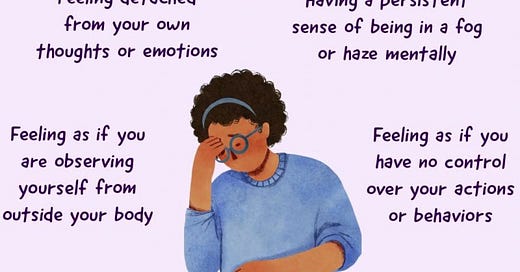QOL FastBlast!: Depersonalization (or Disassociation)
Like "negativity" or whatever you call the many shades of it, "depersonalization" is not a bad thing in of itself, In fact, it can prove helpful when navigating neurological issues and introspection.
In my last post, I added my thoughts to a past post by my friend Schmandrew aka
. Well, Im doing that again. I don’t remember his exact post related to this topic, but I recommend checking out any of his stuff, it all triggers interesting thoughts.So let’s get into it. If you google “depersonalization”, most of what you’ll find is not very “positive”. That’s because it’s generally refers to something akin to the much more complicated Depersonalization-Derealzation Disorder. It’s so complicated, it even has two different acronyms… DPDR and DDD.
And both are indeed troublesome and should be treated with medical attention. But the keyword is “DISORDER”. That connotes that one has fallen too deeply into the less beneficial elements of depersonalization (or disassociation) and is struggling to use them in helpful ways.
The more extreme forms of depersonalization could be the result of emotional/physical trauma, genetics, brain damage (from things like substance abuse, brain surgeries, or high impact to the skull), and anxiety/depression. So yeah… seek medical help if you find yourself veering into DPDR/DDD territory.
Signs That Things Have Gotten Out of Control:
inability to discern reality from imagination
feeling numb or hollow
the physical world appears distorted and artificial
lack of emotion or excessive emotion
I’m certainly no expert, but the more problematic stuff strikes me more as the “derealization” part than the “disassociation” part, but that’s not really what I wanted to get into with this.
What I’m hoping to convey is that the depersonalization part is way more nuanced than Google might lead you to believe.
Have you ever felt more than two of these?
anxious or depressed
listlessness
time feels too fast or too slow… or both
difficulty remembering and completing tasks
altered perception of oneself
the world feels detached from your daily life
it feels like others do not understand the way you experience many elements of living
If you answered “yes” to the query above, then you might be depersonalized.

My point is that depersonalization in of itself is something that most of us feel during “moments” in our lives and is not something to be overly concerned with unless it gets out of control.
While I didn’t think of it as depersonalization at the time, I first experienced it when I was training Brazilian Jiu-Jitsu (BJJ) and Muay Thai. Like most intense physical exercise, there is a fair amount of working through discomfort involved in the process. During these moments of unwinding a human pretzel puzzle or finding superior position while getting punched/elbowed/kicked in the face, I had to go to another place in my mind where the physical intensity wasn’t experienced directly until I could navigate to someplace more pleasant. I would imagine the same is true for anyone who has ever run a marathon, ridden a bike really fast, or anything seriously athletic. We may not call it “depersonalization” or even be highly aware of it, but that’s what it is.
I find my experiences with depersonalization from my more physically able days extremely helpful in my current life managing cancer and its many physical/emotional impacts.
For example, I will often “detach” the completely off-kilter bizarro way my head experiences balance and movement from the rest of my body to manage my balance issues. Thanks to physical therapies like Feldenkreis (a topic I’ll get more into soon), I can spend about 90% of my day not needing a cane to avoid falling over as I walk to the kitchen or bathroom.
The same was true as I learned to manage the pain and nausea associated with cancer treatments. I “turned off” or “separated” my mental experience from the physical experience of the rest of my body. Pain and ickiness is still there, but it’s not front and center… almost as if I’m watching myself from outside my body.
Like “negativity”, the problem with depersonalization is when it slips into disorder and is more prevalent in our lives. There is nothing wrong with it in when it rears its head in moderate to small moments.

Another healthy application of depersonalization that I learned from my more athletic days involves observing the body from outside it. Just as I would navigate out of submission holds without tearing apart a joint ligament or being choked unconscious, I use the constant analysis of micro movements from outside my body to control movement inside my body so I can play guitar again (sort of) or fold laundry without getting nauseous. It’s a combination of retraining my brain (“neuroplasticity”) and managing my physical/emotional experiences via remote control from outside of my body.
It sounds complicated and it definitely can be. Just know that it’s nothing to be scared of as long as you understand what’s going on and how to use it to your advantage.
Again, I can’t stress enough the need to seek medical help if one winds up spending too much time in “remote control mode” outside the body. Still, I think depersonalization can be used in so many ways to improve oneself physically and emotionally. Instead of me boring you with the details, I’ll instead leave you with my favorite song from the second disk of George Harrison’s triple album “All Things Must Pass”.







I like the "remote control" analogy. I'm not sure I've ever experienced depersonalization the way you describe, so that's a helpful reference to have.